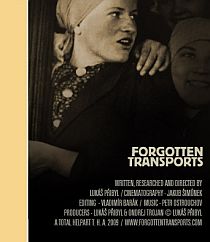


Lukas Pribyl: Forgotten Transports 1-4/ 2

I had an email contact with the director of ”Forgotten Transports”, Lukas Pribyl. Here follows some quotes from his side – and please do also go to the very good site of the film:
How did you make the people talk so fine and precise?” The people talk so precisely because most of them were interviewed for the very first time and did not have anyone to share their recollections with, therefore they only told me what really remembered – no second hand information. Then, the films were edited from 270 hours of interview footage, so I had a lot to choose from. I developed my own interviewing technique, which allows for some repetition and is therefore well suited for editing work.”
You refrain totally from the use of nowadays trend for reconstruction in historial documentaries?” What can be more real than reality? Why reenact and reconstruct something that can be shown through authentic photographs and footage and why speak for people who are perfectly capable of telling their story themselves? (It is their story after all…) The photos used in the film are really of the people themselves, in the places they talk about. So when the women in the film about Estonia speak about a diver in the port of Tallinn, I go to the archives, find the names of all the German divers working in the Baltics between 1941 and 1944, trace them or their families, until I find Mr. Ruehmann’s family and get the picture of the Czech Jewish women helping him onto a boat. That’s why the series took ten years to make. I don’t use any look-alike footage or photos, only time and place precise material. I have had extremely good experience with audiences – they don’t find the stories too complicated or incomprehensible and actually find them “dramatic”enough.”
And a line from the site of the film: The series of four feature length documentary films on the topic of virtually unknown concentration camps and ghettos and little known modes of survival is Pribyl’s directorial debut.